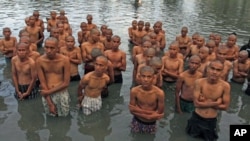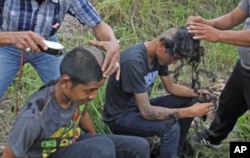Indonesian police in the Sharia-ruled province, Aceh, have detained 25 teenagers, but it is not clear why. The youths call themselves “punks” and human rights activists call their detention an attempt to curb freedom of expression in the traditionally conservative province.
After a charity music event for a local orphanage at Banda Aceh’s Budaya Park on Saturday, police in the province arrested dozens of teenagers for apparently no other reason than their appearance.
Those detained had come to Aceh from as far away as Jakarta and West Java, sporting hairstyles and clothing rarely seen in the conservative province. Witnesses said the youth had mohawks, tattoos, earrings and nose piercings and wore black shirts, dark clothing and tight jeans.
Re-education
Banda Aceh Police Chief Iskandar Hasan said the young people are undergoing a “re-education process” involving haircuts, shampoo and toothpaste, plus a new wardrobe that includes clothing worn during prayer.
The police chief said officers plan to toss the teenagers into a pool as part of their punishment and the young women will have their hair cut in the fashion of female police officers.
Authorities deny the re-education initiative violates human rights, but activists such as Haris Azhar from human rights groups Kontras, have lashed out against the move.
“I think it violates the rights of freedom of expression of youth groups in Aceh and it seems like they are using the defense of Sharia restrictions to limit youth group and how they express themselves.”
Super conservative
Aceh is traditionally more conservative than other parts of Indonesia. The province adopted partial Sharia law in 2001 as part of an autonomy package aimed at quelling separatist sentiments.
The province has specific Sharia bylaws that outlaw homosexuality and gambling, while adultery is punishable to death by stoning.
There are no laws against dressing as a punk, however, and Azhar claims that Aceh police are subjectively interpreting the Sharia bylaw to instill their own view of Islamic morality.
“There is no such law that explicitly limits this kind of thing or is against this kind of thing, against the existence of punks groups in Banda Aceh. But I am afraid that the police were motivated by the cultural perspective, which is also not clear. It is not the duty of the police of how to interpret the meaning of culture,” said Azhar.
Azhar said the Achenese government should accept the punks as part of its local urban and modern culture. As of Wednesday, it remained unclear when Aceh police intend to release the youths.





